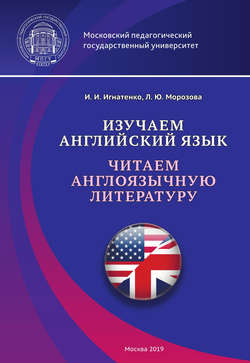Изучаем английский язык. Читаем англоязычную литературу

Реклама. ООО «ЛитРес», ИНН: 7719571260.
Оглавление
И. И. Игнатенко. Изучаем английский язык. Читаем англоязычную литературу
I. Language
1. How do you use language in your life?
2. Origin and development of English
3. The English language: from the past to nowadays
4. English today
5. Lexicology
6. Semasiology
7. Change of meaning
8. Polysemy and homonymy
9. Synonymy and antonymy
10. Word-formation
11. Conversion
12. Word-composition
13. Other ways of word-creation
14. Implications for language teaching
15. Differences between online language learning and f2f learning
16. Introduction to Global Englishes
17. English as a lingua franca
18. The Future of English
II. Literature
1. How people read today
2. British literature
3. William Shakespeare
4. Robert Burns
5. William Wordsworth
6. Dylan Thomas
7. Jackie Kay
8. Bernardine Evaristo
9. American literature
10. Gone with the Wind: film adaptation
11. Mark Twain’s “Adventures of Huckleberry Finn”
12. Tennessee Williams
13. William Faulkner
Topics for Discussion
Sources and Recommended Reading
Отрывок из книги
When we start thinking about what defines us as human beings, and we ask people around us that question, most likely among the first answers that we will get is going to be language or languages. The ability to learn and use languages is our most prized human ability. It probably played a decisive role in our evolving as a species. Also unique, and very useful, is our ability to learn a second language, a third language, a fourth language. Not our mother tongue that we grew up speaking.
Not just lingualism, which would be the ability to acquire and use a language, but multilingualism, the ability to learn and use many languages throughout our lifetime, is another fundamental dimension of the human condition. Indeed, available data indicate that there are more bilinguals in this world than monolingual individuals.
.....
Hindi pyjamas, shampoo, bungalow
Turkish yoghurt, kiosk
.....